Premium Only Content
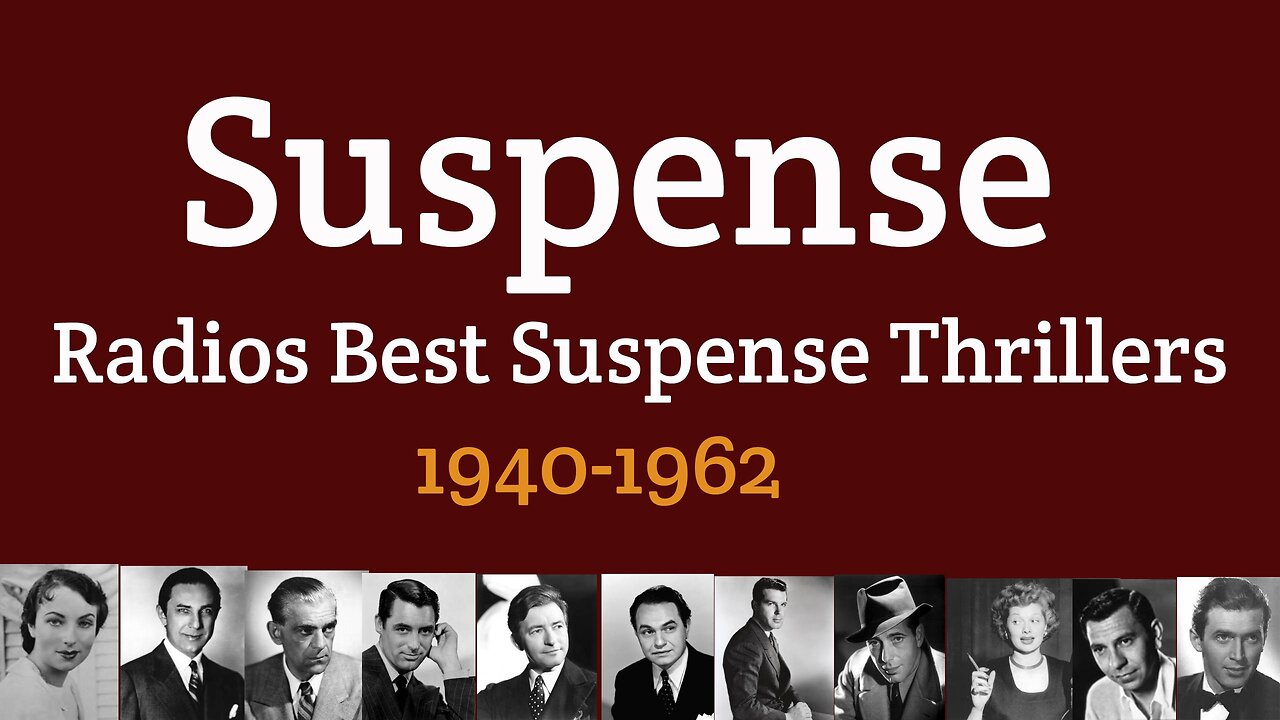
Suspense 1945 (ep166) The Bet (Lee J. Cobb)
Suspense is a radio drama series broadcast on CBS Radio from 1940 through 1962.
One of the premier drama programs of the Golden Age of Radio, was subtitled "radio's outstanding theater of thrills" and focused on suspense thriller-type scripts, usually featuring leading Hollywood actors of the era. Approximately 945 episodes were broadcast during its long run, and more than 900 still exist.
Suspense went through several major phases, characterized by different hosts, sponsors, and director/producers. Formula plot devices were followed for all but a handful of episodes: the protagonist was usually a normal person suddenly dropped into a threatening or bizarre situation; solutions were "withheld until the last possible second"; and evildoers were usually punished in the end.
In its early years, the program made only occasional forays into science fiction and fantasy. Notable exceptions include adaptations of Curt Siodmak's Donovan's Brain and H. P. Lovecraft's "The Dunwich Horror", but by the late 1950s, such material was regularly featured.
Alfred Hitchcock
Alfred Hitchcock directed its audition show (for the CBS summer series Forecast). This was an adaptation of The Lodger a story Hitchcock had filmed in 1926 with Ivor Novello. Martin Grams Jr., author of Suspense: Twenty Years of Thrills and Chills, described the Forecast origin of Suspense:
On the second presentation of July 22, 1940, Forecast offered a mystery/horror show titled Suspense. With the co-operation of his producer, Walter Wanger, Alfred Hitchcock received the honor of directing his first radio show for the American public. The condition agreed upon for Hitchcock's appearance was that CBS make a pitch to the listening audience about his and Wanger's latest film, Foreign Correspondent. To add flavor to the deal, Wanger threw in Edmund Gwenn and Herbert Marshall as part of the package.
All three men (including Hitch) would be seen in the upcoming film, which was due for a theatrical release the next month. Both Marshall and Hitchcock decided on the same story to bring to the airwaves, which happened to be a favorite of both of them: Marie Belloc Lowndes' "The Lodger." Alfred Hitchcock had filmed this story for Gainsborough in 1926, and since then it had remained as one of his favorites.
Adapting the script to radio was not a great technical challenge for Hitchcock, and he cleverly decided to hold back the ending of the story from the listening audience in order to keep them in suspense themselves. This way, if the audience's curiosity got the better of them, they would write in to the network to find out whether the mysterious lodger was in fact Jack the Ripper. For the next few weeks, hundreds of letters came in from faithful listeners asking how the story ended. Actually a few wrote threats claiming that it was "indecent" and "immoral" to present such a production without giving the solution
1942–1962
In the earliest years, the program was hosted by "The Man in Black" (played by Joseph Kearns or Ted Osborne) with many episodes written or adapted by the prominent mystery author John Dickson Carr.
One of the series' earliest successes and its single most popular episode is Lucille Fletcher's "Sorry, Wrong Number", about a bedridden woman (Agnes Moorehead) who panics after overhearing a murder plot on a crossed telephone connection but is unable to persuade anyone to investigate. First broadcast on May 25, 1943, it was restaged seven times (last on February 14, 1960) – each time with Moorehead. The popularity of the episode led to a film adaptation in 1948. Another notable early episode was Fletcher's "The Hitch Hiker", in which a motorist (Orson Welles) is stalked on a cross-country trip by a nondescript man who keeps appearing on the side of the road. This episode originally aired on September 2, 1942 and was later adapted for television by Rod Serling as a 1960 episode of The Twilight Zone.
Suspense received a Special Citation of Honor Peabody Award for 1946.
The program's heyday was in the early 1950s, when radio actor, producer and director Elliott Lewis took over (still during the Wilcox/Autolite run). Here the material reached new levels of sophistication. The writing was taut, and the casting, which had always been a strong point of the series (featuring such film stars as Orson Welles, Joseph Cotten, Henry Fonda, Humphrey Bogart, Judy Garland, Ronald Colman, Marlene Dietrich, Eve McVeagh, Lena Horne, and Cary Grant), took an unexpected turn when Lewis expanded the repertory to include many of radio's famous drama and comedy stars – often playing against type – such as Jack Benny. Jim and Marian Jordan of Fibber McGee and Molly were heard in the episode "Backseat Driver", which originally aired February 3, 1949.
-
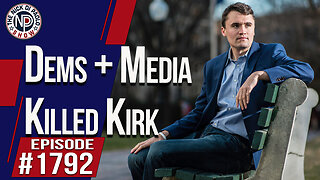 1:01:56
1:01:56
The Nick DiPaolo Show Channel
4 hours agoDems + Media Killed Kirk | The Nick Di Paolo Show #1792
43.6K57 -
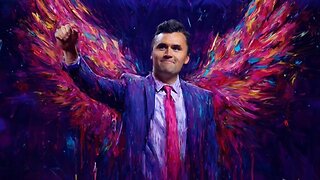 LIVE
LIVE
LIVE WITH CHRIS'WORLD
6 hours agoLIVE WITH CHRIS’WORLD - WE ARE CHARLIE KIRK! Remembering a Legend
144 watching -
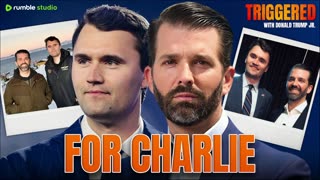 50:24
50:24
Donald Trump Jr.
6 hours agoFor Charlie
312K362 -
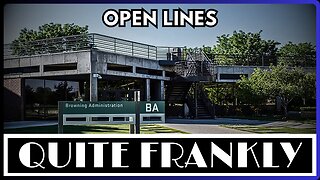 LIVE
LIVE
Quite Frankly
7 hours agoTipping Point USA? & Open Lines | 9/11/25
943 watching -
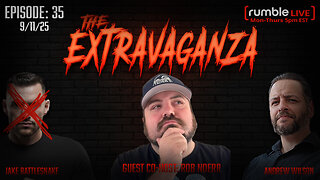 1:04:09
1:04:09
TheCrucible
3 hours agoThe Extravaganza! EP: 35 (9/11/25)
81.9K22 -
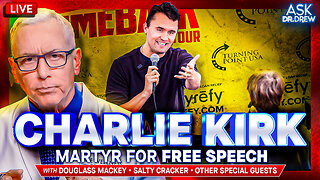 1:19:43
1:19:43
Dr. Drew
8 hours agoCharlie Kirk Assassination: 24 Hours Later, What We Know About The Utah Valley University Shooting w/ Salty Cracker, Free Speech Activist Douglass Mackey & Experts – Ask Dr. Drew
88.8K23 -
 1:17:50
1:17:50
Redacted News
4 hours agoBREAKING! CHARLIE KIRK'S ASSASSIN IDENTIFIED, NATIONWIDE MANHUNT UNDERWAY | Redacted News
287K283 -
 1:05:30
1:05:30
vivafrei
7 hours agoCharlie Kirk Assassination FBI Updates - With FBI Whistleblower Kyle Seraphin
281K199 -
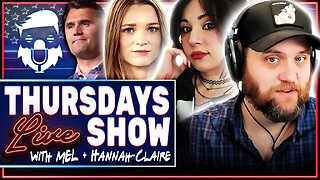 1:59:22
1:59:22
The Quartering
6 hours agoJustice For Charlie Kirk! FBI Releases Photo Of Shooter, Mass Firings For Those Who Celebrate!
312K180 -
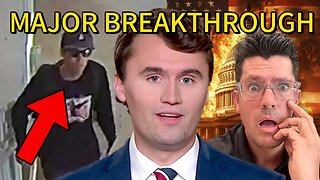 36:31
36:31
Stephen Gardner
6 hours ago🔥NEW: FBI's Bombshell Reveal on Charlie Kirk Assassin!
106K276